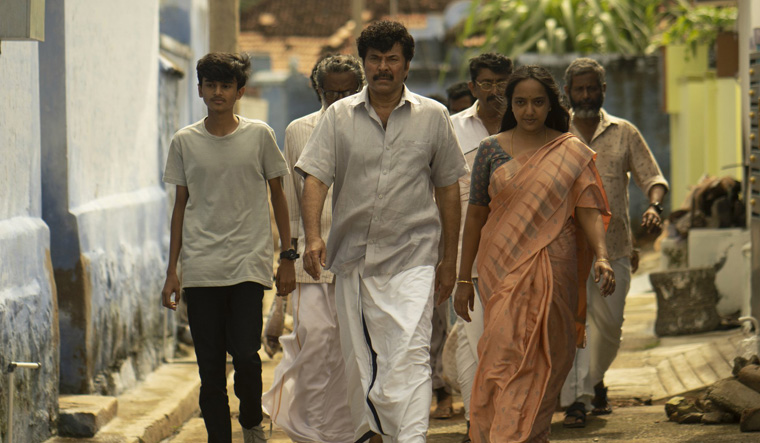A man wakes up from a lazy nap after lunch and forgets what he was, where he was, and to which place he was headed to. He starts to live a new life; starts to speak in someone else tongue; even his memories and music become that of the other person. Ace Malayalam director Lijo Jose Pellissery’s latest, 'Nanpakal Nerathu Mayakkam', is an exploration of his trance state.
NNM is a welcome break from Pellissery’s own mould. The so-called ‘master of chaos’, crafted NNM as a film that is calm and composed in its demeanour. The film opens with a group of Malayali Christian pilgrims returning to Kerala by bus after a visit to the famous pilgrimage centre Velankanni in Tamil Nadu. James (Mammootty), who is travelling along with his wife and son, is presented as a typical mean Malayali chauvinistic male. His aversion and disgust for the rural Tamil culture are established clearly in the first part of the film. But once waking up from a nap on the bus, James would leave the bus, goes to a nearby village and start behaving like a man of that Tamil locality.
In order to bring James back, the entire pilgrimage party would then be pushed to a situation where they had to live in that village.
The film is arguably the most poetic work from Pellissery in his career. He keeps the mind of the audience floating in that rural Tamil village; he also asks the Malayali society to self-reflect on the kind of chauvinism it shows.
Mammootty elevates the roles of James (and his Tamil alter ego, Sundaram). The method actor exemplifies what he is capable of doing when he gets a great script that offers for performance.
S. Hareesh’s screenplay and dialogues, and the visual language in which Pellissery interprets them, are truly world-class. This is Pellissery’s third film with Hareesh. And, NNM does not follow any templates of the other two films, Churuli or Jallikkatt. The dialogues were all sharp, and it rightly wraps beneath the politics NNM wants to speak.
There is a highly effective use of old Tamil songs in this film in the sound design part. The film’s costume design also deserves huge applause. The cinematography of NNM is again a huge shift from what is set as a conventional style for Pellissery. The film’s story demands a treatment where more laid-back static shots are required, and Pellissery gives exactly such a treatment while portraying James’ delusionary journey.
Seems like NNM is a personal film also for Pellisserry. The pilgrimage group is shown to travel in a van of a drama troupe, Sarathi theatres, in the film. The filmmaker’s father, Jose Pellissery, belonged to a drama troupe of the same name in the real life, and the filmmaker has memories of him travelling along with his father to Velankanni on the troupe’s vehicle.
NNM felt like a plain, simple film on the first watch. But it does have some exciting layers. In repeat watches, those layers also would also come to the fore and surprise the audience. It is a must-watch for all those who would like to see a new kind of Pellissery.
Rating: 4/5



